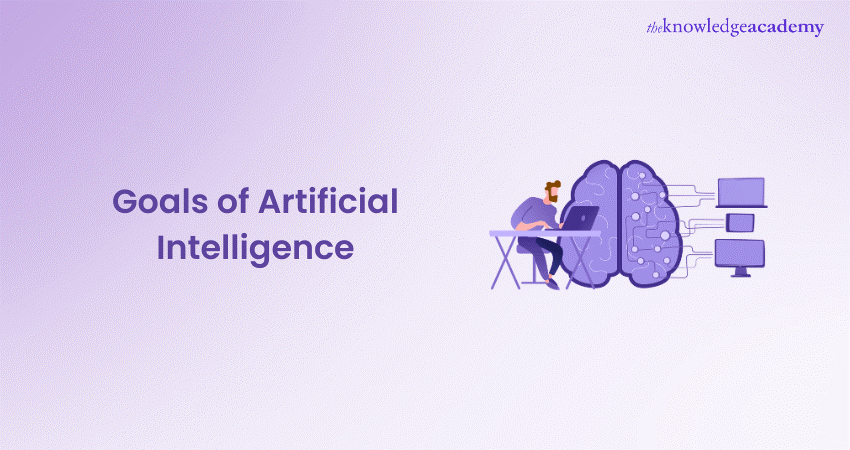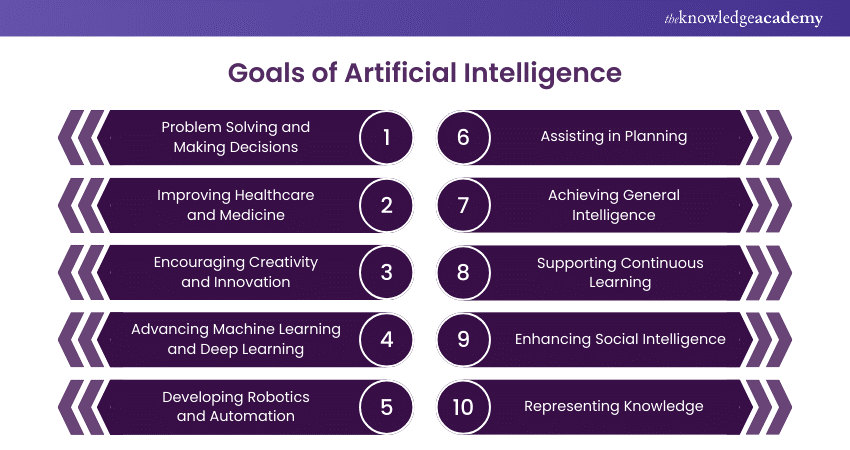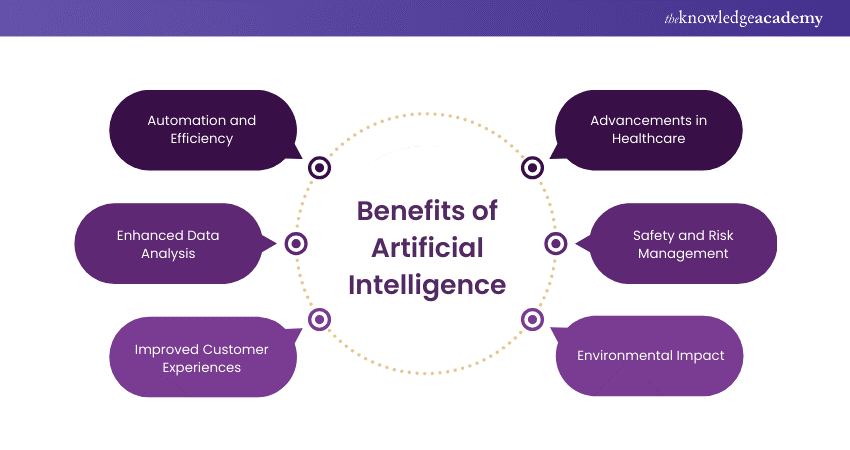We may not have the course you’re looking for. If you enquire or give us a call on +44 1344 203 999 and speak to our training experts, we may still be able to help with your training requirements.
Training Outcomes Within Your Budget!
We ensure quality, budget-alignment, and timely delivery by our expert instructors.

In our technology-focused society, Artificial Intelligence (AI) is changing industries like healthcare and artistic expression. Goals of Artificial Intelligence extend beyond automation; they involve developing systems that can learn, adjust, and enhance.
Envision a future where Artificial Intelligence comprehends our feelings, foresees our requirements, and proactively addresses complicated issues. This blog delves into the ambitious Goals of Artificial Intelligence, demonstrating how these advancements will revolutionise our everyday lives.
Table of Contents
1) What is Artificial Intelligence?
2) Goals of Artificial Intelligence
3) Benefits of Artificial Intelligence
4) Drawbacks of Artificial Intelligence
5) Conclusion
What is Artificial Intelligence?
Artificial Intelligence (AI) involves instructing machines to emulate human thinking and behaviour. This is achieved through the utilisation of extensive data, analysing patterns and connections, and using the gained knowledge to make predictions or decisions.
AI can perform various tasks, such as assisting doctors in diagnosing diseases and forecasting weather patterns, which makes it a valuable tool in our daily routines.
Goals of Artificial Intelligence
The "Goals of Artificial Intelligence" focus on building systems that perform like humans. These goals steer the growth of technologies to resolve complex problems, boost creativity, and improve our everyday lives.

1) Problem Solving and Making Decisions
The main objective of AI is to build systems that solve complex problems through independent decisions. It can assess massive amounts of information, identify current trends, and make informed decisions. Artificial Intelligence is helpful in sectors like finance as it can offer investment and personal finance advice. It can even enhance logistics for supply chain management.
2) Improving Healthcare and Medicine
AI can transform the healthcare sector by incorporating diagnostic strategies and support. Artificial Intelligence examines medical images to detect diseases like cancer. It is used to forecast and treat cancer in its initial stages. AI robots can assist in medical procedures to overcome changes and mistakes created by humans.
3) Encouraging Creativity and Innovation
AI can leverage creativity to promote innovations in various industry sectors. Artists and designers can utilise AI to build next-level art and music. Moreover, artificial intelligence generates unique music for companies with a large amount of data. It has opened doors for new market trends.
4) Advancing Machine Learning and Deep Learning
In the field of AI, you will encounter two specialised areas: Deep Learning (DL) and Machine Learning (ML). The main goal of both is to construct systems that enhance the efficiency of coding. For example, ML and DL use information from surroundings to assist self-driving cars.
5) Developing Robotics and Automation
When it comes to robotics and automation, AI is the core. It aims to provide machines with the capability to work independently. This includes tasks from intricate industrial operations to household duties. Robots can even function in unsafe conditions like space ventures and deep-sea expeditions, thus improving industry productivity by automating tasks.
Want to be an AI Project Manager? Get assistance with our Artificial Intelligence (AI) for Project Managers today!
6) Assisting in Planning
AI has a very high potential for making decisions related to disaster management and business planning. AI systems can evaluate traffic data to enhance city development and reduce traffic jams. Artificial Intelligence can also plan crop rotations and schedules in horticulture via weather pattern analysis. This can lead to better resource management.
7) Achieving General Intelligence
A significant objective of AI research in the long run is to attain general intelligence, commonly known as Artificial General Intelligence (AGI). In contrast to specialised narrow AI systems, AGI would possess the capacity to comprehend, acquire, and utilise knowledge in various tasks akin to human cognitive capabilities. Although we have yet to reach AGI, the quest for these objectives fuels a significant portion of AI research.
8) Supporting Continuous Learning
AI systems are being developed more and more to facilitate ongoing learning, allowing them to adjust to new data and evolving circumstances. This ability is essential for tasks like cybersecurity, where AI systems need to learn how to detect and react to new dangers continuously. Ongoing education is vital in customised learning systems, where artificial intelligence can customise learning experiences based on each student's needs and progress.
9) Enhancing Social Intelligence
Another key objective of AI is to improve social intelligence, allowing machines to comprehend and engage with humans more organic and intuitively. This involves comprehending feelings, cultural intricacies, and societal environments. The use of social intelligence in AI includes customer service chatbots offering empathetic responses and AI systems aiding in mental health support.
10) Representing Knowledge
Knowledge representation is one part of AI investigation that concentrates on how information about the world can be presented. The computer system then applies it to address intricate tasks. This implies organising data in a manner that enables AI systems to comprehend, think, and acquire knowledge. Efficient knowledge representation is essential for creating intelligent systems capable of tasks such as language translation, question answering, and meaningful conversations.
Benefits of Artificial Intelligence
The benefits of AI are vast and varied. It can process and analyse large amounts of data quickly and accurately, leading to more informed decision-making. AI takes over routine and repetitive tasks, allowing human workers to concentrate on more complex and creative initiatives. Here are some key advantages:

1) Automation and Efficiency
AI significantly improves efficiency by automating routine tasks, allowing humans to focus on more complex and creative aspects of their work. This leads to higher productivity and reduced operational costs. For instance, AI-powered automation in manufacturing and logistics optimises production lines and supply chain management, leading to faster and more efficient processes
2) Enhanced Data Analysis
AI systems can process vast amounts of data at incredible speeds, uncovering patterns and insights that humans might miss. This capability is invaluable in fields such as healthcare, finance, and marketing, where data-driven decision-making is crucial. For example, AI algorithms can analyse medical images to detect diseases early or predict market trends by examining historical data.
3) Improved Customer Experiences
AI enhances customer service through personalised experiences and 24/7 support. Chatbots and virtual assistants can handle customer inquiries in real-time, providing immediate responses and solutions. Additionally, AI-driven recommendation systems, like those used by Netflix and Amazon, suggest products and content tailored to individual preferences, enhancing user satisfaction.
4) Advancements in Healthcare
AI contributes significantly to healthcare by enabling early diagnosis, personalised treatment plans, and efficient management of patient records. Machine learning models can predict disease outbreaks, identify potential health risks, and assist in developing new drugs and therapies. For instance, AI algorithms have been used to analyse genetic information to provide personalised medicine.
5) Safety and Risk Management
AI enhances safety and risk management across various industries. In transportation, AI systems improve road safety through advanced driver-assistance systems (ADAS) and autonomous vehicles. In finance, AI detects fraudulent activities by analysing transaction patterns. Additionally, AI-driven predictive maintenance in industries prevents equipment failures and accidents by forecasting potential issues before they occur.
6) Environmental Impact
AI technologies contribute to environmental sustainability by optimising resource use and energy consumption. For example, AI algorithms can improve the efficiency of energy grids, reducing waste and promoting the use of renewable energy sources. AI-driven solutions in agriculture help optimise crop yields and reduce the environmental impact of farming practices by analysing soil conditions and weather patterns.
These benefits illustrate how AI is revolutionising various aspects of society, driving progress and improving quality of life. The continuous development and ethical deployment of AI technologies hold the promise of even greater advancements in the future.
Get practical knowledge on Machine Learning with our Machine Learning Course- sign up now!
Drawbacks of Artificial Intelligence
Despite its many benefits, AI also poses several challenges and drawbacks. One of the primary concerns is the potential for job replacement as AI systems take over tasks traditionally performed by humans. This can lead to economic inequality and requires significant workforce retraining and education initiatives.
AI's ethical and privacy implications are another area of concern. AI systems can breach privacy and misuse information by collecting and analysing large amounts of personal data. There are also worries regarding partiality in AI algorithms, leading to unequal treatment and prejudice in sectors such as employment, law enforcement, and lending.
Furthermore, the development of AI raises significant questions about control and accountability. As AI systems become more autonomous, determining responsibility for their actions becomes more complex. This is particularly concerning in areas like autonomous weapons and other high-stakes applications.
Conclusion
We hope you understand the Goals of Artificial Intelligence (AI) and how it revolutionises various areas of our lives. It effectively gauges critical issues, incorporates creativity, and boosts various sectors for expansion. Alongside its benefits, AI faces challenges like privacy risk, job loss, and ethical issues. So, as technology grows, we are responsible for taking care of both sides.
Unlock career opportunities in the field of AI with our Deep Learning Course- register now!
Frequently Asked Questions

The main objective of AI is to build systems that perform tasks just like humans, such as understanding languages, solving critical problems, making decisions, and pattern recognition.

The purpose of AI is to boost human capabilities through task automation. It also provides insights from massive data collection to innovate something new.

AI is mainly used to automate complex tasks like decision-making and data analysis and enhance user experience. It works well in finance, education, healthcare, and entertainment. It uses advanced technologies like intelligent systems and robotics.

The Knowledge Academy takes global learning to new heights, offering over 30,000 online courses across 490+ locations in 220 countries. This expansive reach ensures accessibility and convenience for learners worldwide.
Alongside our diverse Online Course Catalogue, encompassing 17 major categories, we go the extra mile by providing a plethora of free educational Online Resources like News updates, Blogs, videos, webinars, and interview questions. Tailoring learning experiences further, professionals can maximise value with customisable Course Bundles of TKA.

The Knowledge Academy’s Knowledge Pass, a prepaid voucher, adds another layer of flexibility, allowing course bookings over a 12-month period. Join us on a journey where education knows no bounds.

The Knowledge Academy offers various Artificial Intelligence & Machine Learning, including the Introduction To AI Course, Machine Learning Course, and Deep Learning Course. These courses cater to different skill levels and provide comprehensive insights into History of Artificial Intelligence
Our Data, Analytics & AI Blogs cover a range of topics related to Data Analytics & AI, offering valuable resources, best practices, and industry insights. Whether you are a beginner or looking to advance your Data Analytics & AI Skills, The Knowledge Academy's diverse courses and informative blogs have got you covered.
Upcoming Data, Analytics & AI Resources Batches & Dates
Date
 Introduction to AI Course
Introduction to AI Course
Fri 24th Jan 2025
Fri 28th Mar 2025
Fri 23rd May 2025
Fri 25th Jul 2025
Fri 26th Sep 2025
Fri 28th Nov 2025







 Top Rated Course
Top Rated Course



 If you wish to make any changes to your course, please
If you wish to make any changes to your course, please


